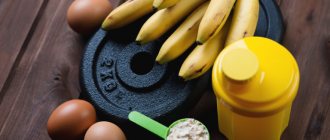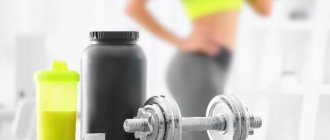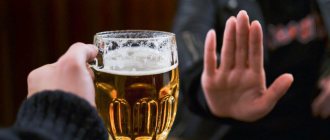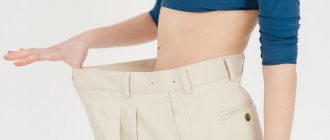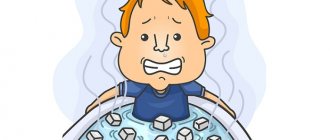Many people in modern Russia prefer beer. It is light, pleasant to the taste, quite relaxing, and also inexpensive compared to wine, which makes foamy drink popular not only among men, but also among women. At the same time, is it possible to drink beer after training? Are physical activity and beer compatible in principle? Because even in the example of many professional athletes, we observed extremely opposite situations: when beer interfered with playing and training, and when beer did not interfere with playing, training and even winning for many years. So where is the truth? Let's figure it out in this article.
Harm and influence of alcohol on training
When Fabio Capello coached the Roma football team, he allowed his players to drink a glass of beer after a successful game. Although I was categorically against drinking cola and juices.
It may be worth celebrating a resounding victory with a glass of foamy drink. But while you are far from the title of champion, think about how your body will react to ethanol entering the bloodstream immediately after training.
Any alcohol-containing drinks are poison! And the first blow always falls on the liver. She tries her best to break down alcohols and remove toxins from the body. Although at the same time she could be busy with a more useful task: destroying lactic acid, turning it into glucose.
Thus, after a glass of wine or cognac, the athlete’s body is not engaged in restoring muscle tissue, but in the fight against intoxication. And you can notice this by the changed state of health.
Consequences of drinking alcohol:
1. Muscle pain
Any hard physical work and training in the gym inevitably lead to micro-tears of muscle fibers. But with proper nutrition and enough sleep, an experienced athlete does not experience soreness in the morning. Alcohol will interfere with this process, and the next day you will feel like a beginner again after your first serious workout in your life.
2. Feeling weak
Slowing muscle protein synthesis slows down the recovery process and significantly reduces muscle strength. So don’t even try to repeat the success of previous classes the next day: at best, your form will return in 2-3 days.
3. Dehydration
In the process of playing sports, the body loses a large amount of fluid, and alcohol, due to its diuretic effect, will only aggravate this process. With dehydration, the volume of blood plasma decreases, which in turn provokes disruptions in the functioning of the cardiovascular system.
All these are just visible violations. While you are tormented by a headache and thirst, a real hormonal and enzyme storm is raging inside:
- Testosterone
. A male sex hormone responsible, among other things, for muscle growth. Alcohol in large doses hits the target - testosterone production almost completely stops. The sexual sphere suffers and muscle mass gain is inhibited. - Somatotropin.
Growth hormone accelerates fat burning and prevents the deposition of subcutaneous fat. Beer inhibits the production of somatotropin the most. That is why this drink is as dangerous as cognac or vodka. - Cortisol
. Steroid hormone. Destroys proteins, increases the level of glucose in the blood, and contributes to an increase in fat deposits. With every glass of wine, the level of cortisol in the body increases. - Glycogen
. Polysaccharide and main source of energy for muscles. Alcohol inhibits its synthesis, causing muscle fibers, exhausted by the load, to literally starve
Almost all organs and systems will “notice” the presence of a toxin in the body:
- Liver
. You will be deprived of nutrients and feel dehydrated, causing you to work harder. - Nervous system
. It will respond to the death of neurons responsible for nerve impulses with memory deterioration and decreased performance. - Gastrointestinal tract
. Alcohol damages the mucous membrane of the stomach and esophagus. With regular use, it provokes the development of gastritis, peptic ulcers, and pancreatitis. But even a single use can result in intestinal upset and long recovery. - Respiratory system.
Ethanol dries out the mucous membrane of the respiratory tract, damages lung tissue cells and disrupts gas exchange in them. - Heart
. Rapid heartbeat, shortness of breath, redness of the skin - this is how our main motor tries to communicate about excess load.
How harmful the effect of ethanol on an athlete’s body will be largely depends on the dosage:
| Dosage | Effect on the body |
| up to 25 g of pure alcohol per 70 kg of weight | A slight tonic effect. Inhibition of the nervous system. Slowing down the process of muscle catabolism. Stopping the breakdown of fats. |
| 25–35 g of pure alcohol per 70 kg of weight | Completion of the tonic effect Increasing cortisol levels Stopping the cell regeneration process |
| from 35 g of pure alcohol per 70 kg of weight | Blockage of growth hormone secretion Rapid loss of muscle mass Accumulation of fatty tissue |
For reference: 100 g of vodka contains 40 g of ethanol, a bottle of light beer contains 25 g of pure alcohol, and a 200 gram glass of dry wine contains 18 g of alcohol.
What are the benefits of sauces and marinades made with beer?
For example, when frying meat, special substances appear in it - carcinogens, which are also found in exhaust gases and tobacco smoke. They can provoke the development of malignant neoplasms. Beer marinade can reduce the amount of these substances. The marinade made from dark beer is considered the most useful - it reduces the effect of carcinogens by almost half.
How to make PP cocoa with marshmallows?
What is spirulina and why is it needed? Algae is often added to PP cocktails
Can you drink alcohol before or after training?
No coach will ever allow an athlete to do strength training if he or she comes to the gym drunk. Within a minute after consumption, ethanol begins its destructive effect: red blood cells stick together, and when they enter the brain, they cause oxygen starvation.
Even a small dose of alcohol before training:
- increases body temperature;
- disrupts thermoregulation;
- causes increased sweating;
- thickens the blood;
- lowers blood pressure.
The athlete himself feels a surge of strength and vigor, but this is the first symptom of intoxication. The feeling of omnipotence is self-deception. When ethanol breaks down, it causes a decrease in muscle tone and impaired coordination. Attention is dulled, the pain threshold is reduced.
If you start an exercise, your heart rate will increase sharply. Due to increased blood viscosity, nausea and dizziness may occur. The athlete may lose consciousness or be seriously injured.
Drinking alcohol on the day of training is fraught with injuries and a sharp disruption in the functioning of the cardiovascular system, including heart attacks and strokes.
Science experiment
In 2014, a group of scientists from the Australian Catholic University, Bond University in Cleveland and McMaster University in Canada undertook to clearly demonstrate to the sports community the harm of alcohol after training.
Young healthy men who had been training regularly for several years were invited for the experiment. They were asked to do intense training only once every two weeks.
And after training, each group of subjects received different nutrition:
- Rest
. The control group did not change their diet and did not drink alcohol. - PRO
. Additionally, whey protein was taken immediately and 4 hours after training. - ALC-PRO
. In addition to whey protein, the men were given 300 grams of vodka per training day in small portions. - ALC-CHO
. This group of subjects was given not only vodka, but also fast carbohydrates in the form of 25 g of maltodextrin.
The results of the experiment were quite expected: The ALC-PRO group demonstrated a decrease in muscle protein synthesis by 24% compared to the control group, the ALC-CHO group by 37%.
Thus, alcohol is strictly contraindicated both before and after training! Drinking before exercise creates additional stress on the cardiovascular system and increases the risk of injury. Consuming ethanol-containing substances after training slows down the recovery process and prevents muscle mass gain.
Several examples will help you imagine how strong the setback will be in the development of the body:
| Situation | Consequences |
| One-time consumption of alcohol to the point of mild intoxication | Equivalent to missing one workout |
| One-time consumption of alcohol to the point of severe intoxication | Decrease in strength indicators for 1-2 weeks |
| Frequent drinking of alcohol, even a little (0.5 liters of beer 3-4 times a week) | 85% of athletes have a complete stop in their progress in the gym. A constant decrease in the percentage of muscle mass, regardless of the effort exerted in training |
There is another good reason to give up alcohol: ethanol washes vitamins A, C, B vitamins, zinc and calcium from the body. All these elements are very important in bodybuilding: they are involved in the production of endogenous anabolic hormones. Without their synthesis in sufficient quantities, neither high-quality recovery nor muscle mass gain is possible.
Are there any benefits from alcohol?
With enviable regularity, “sensational” news appears in publications about how useful it is to sometimes sip a glass of beer or drink 50 grams of cognac. With regular consumption of alcohol, the ability is attributed to:
- reduce the risk of stroke and heart attack by 25%;
- increase the level of “good” cholesterol in the blood;
- prevent the development of type II diabetes mellitus;
- prevent the formation of gallstones.
At the same time, all researchers note that we are talking about small doses of alcohol. And seven glasses drunk in one Saturday evening are not equivalent in effect to one glass, but drunk every day during the week.
For alcoholic drinks to show their benefits, you need to drink a little, but at least four times a week. For a person who lives by sports, this is unacceptable!
The claim that beer is beneficial after a workout is a myth! Not a single study has been able to prove the beneficial effects of the drink on the athlete’s body. As before, the best drinks after active training: clean water, fruit drink and juice. If you cannot do without beer, it is better to choose dark varieties rich in antioxidants.
What about the “beer belly”?
The fact that people get fat solely from beer is nothing more than a myth. Firstly, rarely does anyone drink beer in its pure form. As a rule, snacks are used: chips, nachos, croutons and croutons, dried fish. Secondly, one of the problems with beer is that it activates the feeling of hunger. The more beer we drink, the more we want to eat - this creates the risk of weight gain. So the well-known “beer belly” is not from beer at all, but rather from the genetic characteristics of some males.
Photo: Getty Images
If you do not know the limits in beer consumption, it can also lead to gastritis, pancreatitis, infertility, headaches and nervous diseases.
How does alcohol affect weight?
Alcohol is especially dangerous for those who are exercising to lose weight. And not only because of its high calorie content, although this fact is also worth taking into account. Alcoholic drinks provoke weight gain in an athlete in three ways.
1. Increased appetite
Any alcohol stimulates a ravenous appetite. Firstly, because of its bitter taste. Secondly, irritating the walls of the stomach. The hunger after drinking is actually insurmountable.
And considering that self-control mechanisms are switched off already from the first glass, you definitely won’t be able to restrain yourself. Each new portion of wine or tequila starts this process over and over again. You overeat, disrupt your body transformation plan, and reproach yourself for being weak-willed.
2. Fluid retention
The next day after drinking alcohol, the athlete will definitely see weight gain on the scale. This is swelling caused by ethanol. Of course, after a day or two the body will remove excess intercellular fluid, but you will clearly see that a thoughtless attitude towards oneself does not pass without a trace.
3. Metabolic disorders
Each entry of ethanol into the blood is accompanied by the release of insulin. And if you pamper yourself with beer at least 2-3 times a week, the accumulation of subcutaneous fat and fat on internal organs will inevitably begin. Persistent metabolic disorders will occur.
1 gram of 96 percent ethanol contains 7 kcal. Add to this the calorie content of sugar and flavor enhancers. Alcohol is always empty calories that do not bring any benefit to the body.
Beer builds strong bones
A 2007 study published in Nutritional Health and Aging found that silicon in the diet is a critical component for bone and skeletal tissue. Guess where the most silicon is? In beer. The amount of silicon in a pint of beer varies from beer to beer, although IPA (India Pale Ale) beer is best due to its light malt and rich hop content, the main source of silicon. However, a study published in the journal Food and Science in Agriculture found that three bottles of any beer will cover your daily requirement.
How long after training can you drink alcohol?
The worst thing you can do for your body is to drink in the first hour after completing physical activity. The first 60 minutes after exercise is a critical period of time during which rehydration, electrolyte and energy replenishment occurs.
There is much less chance of seriously harming the body if 6 hours pass between training and drinking strong drinks. Thus, when planning evening gatherings with friends, you should go to the hall before noon.
It strengthens connections
A study published in Psychological Science found that moderate doses of alcohol strengthen bonds in social groups. The number of people smiling in company also increases. Our social connections are very important - especially when it comes to sports. A few sports friends will save you from idleness on a cold morning and make you finish the necessary repetitions in the gym.
How to reduce harm from alcohol?
It is impossible to completely eliminate the negative impact on the body. But there are techniques that will at least slightly reduce the damage caused by strong drinks:
- If you know what you will be drinking, take 500 mg of ascorbic acid and drink plenty of water.
- Do not drink alcohol on an empty stomach and be sure to snack on protein foods: meat, fish, cheese.
- Never mix alcoholic drinks, this will only make your hangover worse.
- The next day, start your morning with a glass of citrus juice.
Have breakfast with cottage cheese, fruit or porridge. The worst thing you can do the day after a wild party is drink strong tea or coffee. Caffeine, of course, will perk you up for a couple of hours, but will worsen dehydration. And the hangover will come with renewed vigor. - Take a contrast shower. At the same time, the difference in water temperature should be minimal - the body does not need additional stress now.
- To combat dehydration, drink plenty of clean, still water. On average, for every serving of alcohol you need to take double the serving of water. But if the alcohol was strong, even this may not be enough.
- After a drinking party, avoid intense workouts for the next 2 days. Do some stretching and include a bike ride or jog at a calm pace in your routine.
Pharmacy medications also help stop the effects of alcohol: Alka-Seltzer thins the blood and reduces the load on the heart; Enterosgel and Zorex absorb and remove alcohol metabolites from the body.
Cabbage, parsley and lemon help quickly remove toxins from the body.
Is it possible to combine alcohol and sports?
Of course, no one has ever died from one glass of beer. But, if training has long become an integral part of your life, it’s time to seriously think: what exactly do you expect from working out in the gym?
The only goal is to feel muscle tone and maintain weight within normal limits - drink for your health! But not on training days and in moderation.
But more global goals, for example, a noticeable reduction in body weight or participation in competitions, pose the question bluntly: is a couple of cans of beer really worth it to negate long hours of grueling work on your body?!
And yet, some athletes like to break the rules. So, in 1989, Canadian students decided to have fun: combine running and partying. This is how the “Beer Mile” appeared: a circle around the stadium, a glass of beer, and so on four times. The idea caught on and is still alive: while America runs in the company of a foamy drink, Europe organizes wine races of 10, 21 and even 42 kilometers.
conclusions
And in conclusion, it is worth adding that the individual characteristics of the body should also be taken into account in order to correctly assess the situation. If the body does not have a sharply negative reaction to the use of foam, even during sports activities, then moderate use will not cause immediate harm and will not ruin the athlete’s career. However, caution, attentiveness, and sensitivity to the body and its signals are required, if it gives us such.
It is worth saying that athletes in the West, being true professionals, do not drink beer or even carbonated drinks, which we have recently observed at press conferences, and some athletes have been noticed that even after the end of their career they still eat very healthy . The lack of beer and the availability of proper food allows the same football players in the West to often look much younger than their peers.
In conclusion, we understand that you, in turn, are also interested in the question, not only from professional athletes, but also from ordinary people. Many of us go in for sports to stay in shape and sometimes I also prefer to drink foam, for them we also wrote a separate article with several tips on how to drink alcohol and not gain weight.
Please rate the material!
5 / 5. Ratings: 1
Be the first to rate
Thank you for your rating! This is important for us
Tagged Beer, health, recommendations

